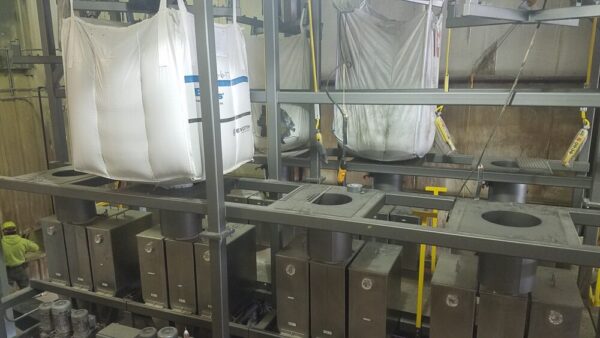Bulk Bag Resupply of Batching System

Bulk bag resupply of a batching system: When you need to resupply your ingredient batching system (micro, minor, major weighments) with ingredients that come in bulk bags, Sterling Systems & Controls has the answer, and here is a great example. Feeding poultry on a mass scale to promote egg production, and needing the flexibility in manufacturing feed with varying formulations to meet production demands, necessitates an ingredient batching system with high throughput and production capacity. Integrating bulk bag resupply of ingredients in the batching system is essential.
Most often micro ingredient batching system bins are resupplied by small bags, e.g. 25lb, 25kg, 50lb, etc. and this is done manually by an operator. Ingredient lot tracking, which is important in many industries, is easily accomplished using optional locking lids, barcode scanning, or operator manual entry of ingredient lot data. However, periodically ingredients are purchased in “bulk”, often 1000lbs or more at a time in a single “bulk bag” or FIBC (flexible intermediate bulk container). When bulk bags are to be integrated into a micro ingredient batching system, this requires expertise in bulk bag discharging or unloading as well as batching and material weighing systems. Sterling Systems & Controls uniquely brings the combination of expertise in weighing, batching systems, process equipment, bulk bag unloading, process controls and automation to custom engineer and manufacture the best possible micro ingredient batching system using bulk bags for ingredient bin resupply.

Example Application
Feed production for an egg farm required a twenty-four (24) bin micro ingredient batching system. Eight (8) of the bins would include ingredients supplied from FIBC’s (bulk bags). Custom engineering the system, Sterling Systems & Controls integrated its bulk bag discharging equipment and controls to handle this. The bulk bag unloading system consists of the following features:
- Bag hoist.
- Heavy-duty frames to support bulk bags.
- Bulk bag funnel with door access to untie bags to reduce dust and provide for operator safety.
The overall system was custom-engineered and included the following:
- Twenty-four (24) micro supply bins, each with about 200lbs capacity.
- Eight (8) integrated bulk bag unloading stations.
- Four (4) micro-scale hoppers.
- Sixteen (16) 3″ auger-type feeders.
- Eight (8) 4″ auger feeders (for bulk bags).
- Stainless steel construction for contact metal.
- Painted mild steel for non-contact metal.
- The typical batch size is 8,000lbs.
- Batch time is 2-3 minutes.
- Controls.
The system reduces the handling of the ingredients, ensures the ingredients are weighed accurately and efficiently, and provides lot-tracking capabilities for all ingredients and batches. The scale hoppers provided in this system provide the high accuracy required to meet the desired minimum inclusion requirements and the capacity to meet expected maximum batch sizes.
Features that separate Sterling Systems & Controls auger-type feeders from competitors include:
- Industrial bearings are used at both ends of the feeder assembly to support the auger and prevent it from making contact with the auger housing.
- Seals in a seal plate are located between the product zone and the auger bearings.
- An air gap between the bearing and seal plates creates a buffer zone to ensure the product doesn’t enter the bearings and grease doesn’t enter the product.
The augers supplied with the feeders are multiple-pitch designs for accurate and repeatable weighments batch after batch. The augers are suspended using shaft clamps, and the auger thrust load is not transferred to the drive assembly, increasing the drive life. Shock-absorbing couplings help reduce the start and stop shock on the motor and drive.
Conical rectangular scale hoppers were used rather than the roll-over-tub scale design routinely used by other manufacturers as they cause the material to become airborne with a chance that the material may not completely discharge for each batch. The conical scale hoppers are of clean design with no ledges and the corners are rolled to prevent material from hanging up so that the entire content of the scale hopper is discharged. The scale’s weight is kept to a minimum to increase the resolution and accuracy of the scale. Butterfly discharge valves are used, rather than slide gates to ensure years of leak-free operation (eliminates leak from material buildup on the backside to the gate).